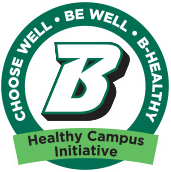EAP Mission
The Binghamton University Employee Assistance Program (EAP) is a valuable benefit dedicated to supporting and enhancing the total well-being of faculty and staff in an effort to create a healthier workforce resulting in resilient communities both on and off campus.
EAP is committed to offering diverse and inclusive services and programs that attract and serve all employees across race, gender, age, religion, identity, sexual orientation, socioeconomic status, nationality, ability and experience. Everyone is welcome to bring their authentic, whole selves to EAP. Together, we will build a culture that encourages, supports, and cares about the diverse voices of the Binghamton University faculty and staff.
Services
When personal or work-related problems become excessively challenging to manage, Binghamton University's Employee Assistance Program (EAP) can offer assistance. EAP provides individualized assessment and referral to community and professional resources, consultations for supervisors and organizes various special programs and lunchtime workshops throughout the year to foster the holistic well-being of University faculty, staff, graduate student employees, retirees and their families.
All Services are:
- Voluntary
EAP services are voluntary; that means clients must initiate contact with us. Supervisors/managers may refer employees to EAP; however, acceptance of a supervisory referral won't alter an employee's responsibility to improve work performance. Neutrality and confidentiality are our cornerstones. - Confidential
Information revealed by an individual through consultation with an EAP coordinator is kept confidential and doesn't become part of the individual's employment record. EAP won't share client information with anyone without the client's written consent unless (1) disclosure is directed by court order, executive order or work rule; (2) the client appears to be in immediate danger of harming themselves or another person; or (3) information shared with EAP reveals concerns related to suspected/possible child abuse or neglect. - Free
EAP services are provided free to Binghamton University faculty, staff, graduate student employees, retirees and their families. If a referral is made to an outside provider, the cost of the service is the responsibility of the client. Costs incurred for such outside services may be covered in part or fully by the client's health insurance. EAP does not provide onsite counseling nor do they provide financial assistance to pay for counseling services. You do not need a referral from an EAP coordinator to see a mental health provider. Please contact your insurance company directly for any questions related to billing or copays so that you receive accurate, up-to-date information.
EAP Structure
The Binghamton University EAP is part of the New York State Employee Assistance Program (NYSEAP), a state workforce initiative, and has received support and endorsement by the state management and unions for 30+ years.
The Binghamton EAP also operates within the framework of a joint labor-management committee to ensure that the needs of both the University administration and workforce are
met.

Binghamton University EAP
Academic B, room 110
607-777-6655
EAP@Binghamton.edu
Monday–Friday: 8 a.m. – 5 p.m.
NYS EAP is available 24/7/365:
1-800-822-0244
Suicide and Crisis Lifeline: call or text 988